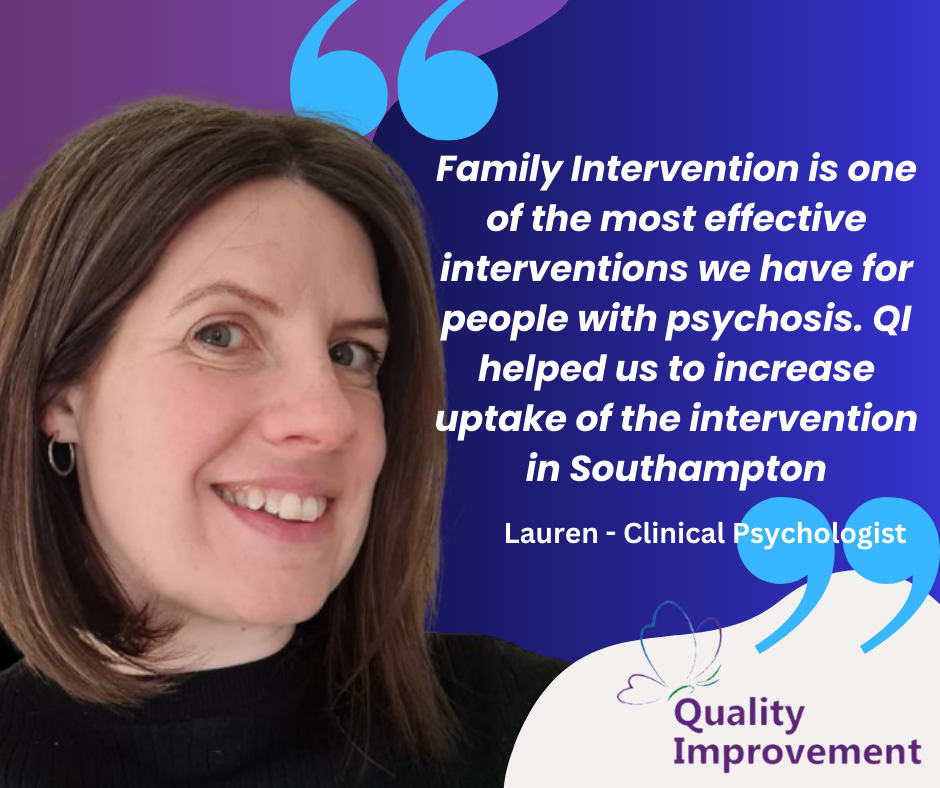The Southampton Early Intervention in Psychosis (EIP) service exists to assess and treat psychosis in service users aged between 14 and 65.
The EIP service is made up of specialists who work exclusively with people experiencing first episode psychosis for a period of three years, following initial onset of symptoms. Consisting of care co-ordinators, CBT therapist, Clinical Psychologist and Assistant Psychologist, Consultant Psychiatrists, Carer’s worker, Individual Placement Support (IPS) worker and Support Time and Recovery (STR) workers, the EIP service is a multidisciplinary team that can offer service users a full spectrum of care.
The issue which presented itself to the EIP service was that one of the most successful methods of improving outcomes in psychosis – known as Family Intervention – had an extremely low uptake.
For the uninitiated, Family Intervention (FI) (also called Behavioural Family Therapy (BFT)) enables the family or friends of the service user experiencing psychosis to learn how to build on strengths to improve relationships at home. Family Intervention incorporates psychoeducation about psychosis, communication skill training and problem solving; and it can be carried out by trained practitioners within teams and is recommended to last a minimum of ten sessions.
The primary reasons for low uptake of Family Intervention (just 4.2% as of September 2021) within the Southampton EIP were identified as: a lack of staff knowledge or confidence in making effective offers of FI, families viewing being offered FI as belittling, and low numbers of staff trained in the delivery of FI.
So, even though FI is recognised as a highly effective alternative treatment in EIP (as opposed to more traditional Cognitive Behavioural Therapy for Psychosis (CBTp)), the ineffective offers to service users’ families and a lack of staff able to deliver FI led to a drastically low uptake among service users. Once this was recognised, the Southampton EIP service embarked upon a Quality Improvement project to increase the offer of FI to service users, engaging with the Southern Health Quality Improvement team’s Nathan Clifford.
Nathan Clifford, Expert by Experience and QI Coach said: “It was great to be able to support Lauren and the team with this project. Utilising some of the QI methodology, tools and concepts such as root cause analysis and driver diagrams, Lauren and the team were able to make big improvements and I am sure that they will continue with increased uptake of FI. I am excited to see them join a national EIP QI collaborative and take the service from strength to strength.”
Dr Lauren Colgan, Clinical Psychologist at Southampton EIP service said: “Family Intervention is one of our most effective interventions we have for people with psychosis. It has been consistently found to reduce relapse, to reduce client rehospitalisation to reduce suicide risk, increase carer wellbeing and reduce carer stress. It's as effective as medication and more effective than CBT. However, we found we had low uptake of around 4% and we were aiming for around 24% to be considered as a well performing service. We used a PDSA cycle to discover that staff had a lack of knowledge about what FI was, and there was a lack of confidence in making offers.
“Family Intervention is a standardised therapy delivered by one or two practitioners who have been trained in delivering FI as this specific therapy. It's delivered to clients with psychosis and somebody in their supportive network. So typically, that might be family members, but it could also be a partner, it could be friends, anyone who would think of as a supportive person in their network. It is usually delivered over 10 to 12 sessions, weekly or fortnightly, and aims to cover a few of the main target areas."
Read the full article HERE

